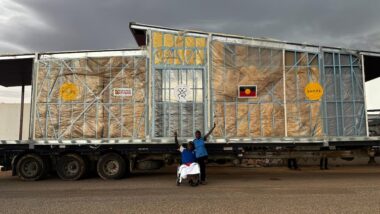An RMIT-led report highlights the negative effects of local bank closures are further compounded by the lack of affordable and reliable internet in regional and remote communities.
Led by RMIT and Swinburne University researchers in the ARC Centre of Excellence for Automated Decision-Making and Society (ADM+S), the submission was made to the Senate inquiry into regional bank branch closures.
It found remote First Nations communities still rely on face-to-face interactions with their banks, despite the growing prevalence of online banking.
Project lead and Distinguished Professor Julian Thomas said in-person interactions were especially important for complex banking tasks and tackling elder abuse, scams and fraud.
“The quality, reliability and cost of internet in remote areas also pose challenges for these communities, making going to a branch to speak to a person even more crucial,” Thomas said.
“By removing banks in regional areas, it potentially disadvantages an already vulnerable community from accessing basic necessities such as financial services - impacting their independence.”
Thomas said better online safety was paramount to improving digital access and participation, but the infrastructure of reliable internet needs to be in place first.
“We can't expect these communities to learn about online safety if they don’t have working internet to begin with,” he said.
Previous RMIT research for the ADM+S Centre found remote First Nations communities were among the most digitally excluded people in Australia.
The “Mapping the Digital Gap” 2023 Outcomes Report found a significant gap in digital inclusion for First Nations people compared with other Australians, which widens substantially with remoteness.
The research showed about 43% of the 1,545 First Nations communities and homelands across Australia have no mobile service – including some with only a shared public phone or no telecommunications access – highlighting a need for action to close the digital gap.
The study highlighted accessing digital technologies was most challenging in remote communities due to limited communications infrastructure, low household access and patchy, congested mobile services.
With residents in remote communities typically on low incomes, 84% of these respondents in the study used or shared a mobile device, and 94% of these used pre-paid services.
The high cost of pre-paid data and low household uptake of fixed broadband also led to significant affordability issues.
Lead investigator and Senior Research Fellow, Dr Daniel Featherstone, said as banking, government and other services increasingly moving online, it’s crucial that all Australians can effectively access and use digital technologies.
"Everyone should have the opportunity to benefit from digital technologies,” he said.
“We use these technologies to access essential services for health, welfare, finance and education, participate in social and cultural activities, follow news and media, as well as connect with family, friends, and the wider world.”
“Improving digital inclusion and access to services is critically important to ensure informed decision-making and agency among Aboriginal and Torres Strait Islander people.”
Contact details:
Distinguished Professor Julian Thomas: 0410 569 457 or [email protected]
General enquiries: 0439 704 077 or [email protected]


